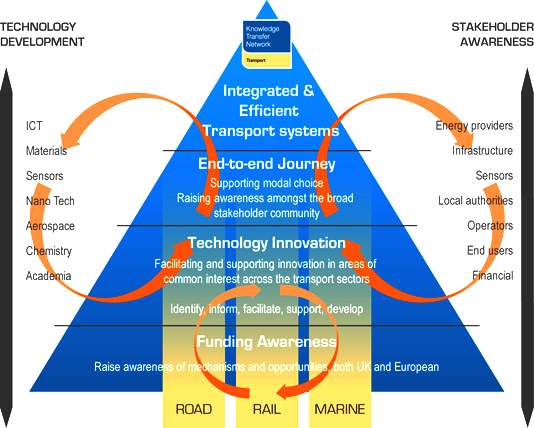|
The
Technology Strategy Board has announced the second Vessel
Efficiency competition “Better systems at sea”. This £3Million
collaborative Research and Development competition will open the
6th January 2014. The
aim of the competition is to build collaboration across the marine
and maritime sector, improving the viability of supply chains,
ensuring continuity of supply, and
creating opportunities for smaller businesses.
The
Transport Knowledge Transfer Network would like to invite you to
attend one of the free information days that we will be holding on
this competition. This will be your opportunity to hear
about the full scope, what the Technology Strategy board are
seeking, the competition process, funding levels, and help
you network to find collaborative partners.
To
register to attend one of these events, please click on the links
below:
We
have established an official group online, and you can access it
by using this link.
I would recommend that anyone interested should join the group to ensure that
they are one of the first to hear further announcements regarding this
competition.
CONTACT
Rob
Furlong
Transport
Knowledge Transfer Network
KTN
Development Manager
Mobile: +44 (0)7971 503377


Neil
Crockett and Simon Edwards
The Technology Strategy Board
(TSB) exists to part fund technology which would otherwise not be developed by smaller
concerns. If you are not in business but have the know how, it is
unlikely that you will be able to attract funding for your project,
where the TSB score against you for not have worked with other companies
before, which seems to us to rule out new talent. This is a major
failing of the TSB, even if it is a business reality in
the UK.
TSB schemes are a tantalizing carrot and nothing more for innovators,
unless they have business partners of long standing.
The patent system too works against
engineers with bright ideas. The TSB advertise that they will part fund
forward maintenance fees, but in a recent application turned down
funding because these sums had been included.
Equally,
the TSB could not see that patent protection was necessary as part of a
solid marketing plan, which says to us that the Board is run by people
who have limited or no experience in Licensing. Where the TSB were
offered sight of a patent specification under Non-Disclosure protection,
they said in their feedback that the patent specification was not
available to them - when clearly it was. Hence, forget about the TSB if
you have patentable technology that you do not want to disclose, except
confidentially. That of course rules out most innovation with earning
potential. Since, innovation is only of commercial value if there is
market protection.
IP protection (copyright) for artists and writers is free.
Engineers have to pay through the nose for limited shelf-life
protection, that is rarely long enough to recoup their investment. The
TSB would dilute even more the only protection that is available to
engineers.
The TSB say that they cannot do anything to change current thinking, but
that their role is to stimulate technology
enabled innovation in the areas which offer the greatest scope for boosting UK growth and
productivity - which aim is subjective. The TSB aims to promote, support and invest in technology research, development and
commercialization. In our experience they are doing their best in
difficult circumstances to spread knowledge by bringing people together,
and that in itself is worthwhile for advancement. But the time spent
making an application is time wasted for real innovators who want real
protection. The TSB don't understand vision, they understand widgets.
It is the TSB's job to advise the Government on how to remove barriers to
innovation, on the basis that innovation leads to future job creation.
Start up projects do not have a track
record for them to be able to attract conventional business loans -
suggesting that there should be a system of funding for those with IP
rights and that the IP system should be changed to protect engineers
without the present financial penalties.
The
TSB claim work in areas where there is a clear potential business benefit, helping today's emerging technologies become the growth sectors of
tomorrow, but in reality they only back existing business with a track
record.
Candidates should therefore seek to identify the commercial potential,
but then if they do so and advise the TSB in any application, that may
well prejudice the acquisition of suitable protection. It's a difficult
subject and not without its ups an downs.
A
better way than the TSB is to advertise opportunities for collaborative
research and development where funding partners may be found, such as
with the Canadian NineSights social platform, operated by NineSigma. The
UK should consider such a billboard system which genuinely puts ideas in
touch with capital for development, from companies who are looking for
solutions, rather than trying to persuade industry to their own agendas.
TBS's VISION
The Technology Strategy Board
(TSB) is an executive non-departmental public body (NDPB), established by the Government in 2007 and sponsored by the Department for Business, Innovation and Skills
(BIS). The equivalent role in Japan is carried out by ClassNK,
who are investing three times as much in the same research areas.
The activities of the Technology Strategy Board are jointly supported and funded by BIS and other government departments, the devolved administrations, regional development agencies and research councils.
VESSEL
EFFICIENCY COMPETITION - Piloting UK marine and maritime innovation
= 50% of eligible costs
Together with the MOD’s Defence, Science and Technology Laboratory and Scottish Enterprise,
TSB are investing up to £8m in collaborative R&D and fast-track projects to deliver viable solutions for more efficient marine vessels.
It is though not really a competition, which suggests a prize. It is a
sweetener for existing businesses.
TSB are looking for UK businesses to develop solutions covering many aspects of efficiency in existing and future
ships,
boats, submarines, and their associated equipment and systems.
TSB are seeking innovative proposals that address the issues of improving current vessel performance and efficiency, but at the same time attract projects for
future vessel
design, coatings and
propulsion systems.
The competition is also aiming to build collaboration across the maritime and marine industry, and develop UK-based supply chains and SMEs to underpin a national Strategy for Growth.
Proposals must be collaborative and business-led. TSB would like to see micro and small businesses involved.
They expect to invest between £500k and £3m per project, although projects outside this range will be considered.
This is a fast track and two-stage CR&D competition that opens on 14 January 2013. The deadline for applicants to register for both types of project is noon on 20 February 2013 and the deadline for expressions of interest is at noon on 27 February 2013.
A briefing event for potential applicants was held in London on 22 January 2013 and consortia-building events, to help applicants to find
partners to work with.
We
look forward to publishing details of the successful applicants.
HEADINGS
The competition aims at accelerating
innovation and technologies to enable more efficient vessels by attracting UK
supply chains to deliver solutions that could include (but are not limited to) the
following themes, amongst others:
Innovation and technology themes in the Marine Vessel Efficiency Competition include, but are not limited to:
•Lightweight, lower carbon materials and structural optimisation
•Smart and multifunctional, self healing, fire resistant, low friction coatings, embedded sensors
•Positioning and communications - Space and satellite systems, better user interfaces for complex systems
•Secondary Heading - Lightweight, lower carbon materials and structural optimisation
•Autonomous sensing, avionics and advanced navigation - Autonomous systems, remote command and control, trim and stability controls for energy efficiency and safety
•Smart green propulsion and alternative low carbon / emission systems
- Electric propulsion, motors, drives, controllers, energy storage, power management, batteries, engine exhaust after treatment & emissions reduction, heat & power recovery, and alternative fuels
•Vessel design and engineering - Hydrodynamics, improved efficiency of manufacturing processes to reduce material consumption, waste, energy use and carbon emissions
https://connect.innovateuk.org/web/vessel-efficiency/overview
*
weight optimisation
* smart materials
* positioning and communications
* autonomous sensing, avionics and advanced navigation
* smart green propulsion and alternative low carbon/emission systems
* vessel design and engineering.
KEY
DATES
Competition opens 14 January 2013
Briefing event 22 January 2013
Registration deadline 20 February 2013 noon
Expressions of interest (EOI) deadline 27 February 2013 noon
Stage 2 opens for invited applicants 18 March 2013
Deadline for invited applications 1 May 2013 noon
International
programmes
In
a century of globalization, many of the greatest business
opportunities will be international. Successful UK
companies must take into account the global picture.
Increasingly global trends and technical developments affect the
competitiveness of UK businesses.
Newly,
and rapidly developing economies are both a threat to the UK economy,
and a huge market opportunity. The most successful UK businesses
and innovations are those with a global, rather than a local market.
To
support UK business in Europe the Technology Strategy Board is
responsible for a national helpline 0300 321 4357 which
is the first point of contact for any enquiries about European
activity. The Technology Strategy Board provides a set of
National Contact Points that offer:
The
Technology Strategy Board is directly responsible for eleven National
Contact Points. These are listed below with links to each NCP:
More
information and detail can be found by following the links above.
For
general queries about EU R&D Calls please contact james.clipson@tsb.gov.uk
A
full list of the UK National Contact Points is at http://cordis.europa.eu/fp7/ncp_en.html
The
Technology Strategy Board supports the Eurostars Initiative - The
Eurostars Programme is the first European funding and support programme
to be specifically dedicated to SMEs. Eurostars is open to all sectors
for funding applications on a continuous basis until 2013; there are two
calls a year closing in March and in September. More information
can be found at http://www.innovateuk.org/internationalprogramme/eurekaeurostars.ashx

David
Bott explains the limitations of the TSB
DAVID
BOTT
Our goal is to drive economic growth based on innovation. Growth mostly comes from doing something new, and often requires new knowledge to minimise risk. We have recently changed our funding rules to encourage more interaction between SMEs and the research base,
though we score negatively against any "new" SME!
Being a public agency comes with a whole bunch of rules, some of which are obviously sensible and some of which are inherited from our previous existence (when they were probably sensible for that set of circumstances). And, of course, rules develop and change over time. One set of rules we operate under is called “state aid” rules. They are a set of
European rules that are designed to stop individual countries supporting companies based within it and enabling them to gain an unfair advantage over companies operating in other countries.
When we were set up in 2007, we inherited what is called a “state aid exemption” which set the way we could support UK based companies. There were many parts to this exemption, but one important one was that we could not fund projects for more than 50% of the total costs (technically, we can fund at 75% for very early stage work and only 25% for late stage work, but the bulk of what we do falls under the 50% definition!). Another important factor to remember is that the Collaborative Research and Development Grants were a linear descendant of the old LINK grants, which were specifically designed to support interaction between larger companies and the research base.
Within these collaborations, we were allowed to support 100% of costs in universities, 50% of costs in large companies and 60% of costs in small and medium sized companies. However, if a company wanted to work with a university on a project costing £200k, and (for example) their project was split equally between the two organisations, then the university could claim their £100k but the company could not claim anything because the cap on project funding (50%) cut in.
Many larger companies thought this cost was acceptable, but most smaller companies we talked to were put off working with universities because they got no support for their part of the project! Given that our research base is among the most powerful in the world, we were effectively denying supported access to it for smaller companies.
Earlier this year, our inherited state aid exemption ran out and was replaced with a more general “block exemption”. This enabled us to look again at what we wanted to achieve and so we changed our rules. We were able to do away with the “project funding cap” of 50%. We kept the funding allowance of 100% for research organisations (which along with universities now includes many research and technology organisations (RTOs) that supply research services), 50% for large companies and 60% for smaller and medium sized companies. However, since our primary purpose is to support economic growth, which happens in companies not the supply side of the ecosystem, we expect that in collaborations that involve the research base that at least 70% of project costs will be in the companies.
However, there are some competitions that are specifically designed to encourage engagement with the research base (the Biomedical Catalyst is a good example), and in these competitions, we only require at least 50% of project costs to be in the companies. This variation will be clearly specified in the competition scope document.
This change came into effect for competitions launched after the 1st October and was described on our web site and in competition briefings, but we still find people applying for the wrong amounts.
It is interesting to reflect on how we communicate to companies the fact that this change is meant to help them. If we had issued a press release, we are sure most journalists would not have been interested. We have put it out through the Knowledge Transfer Networks and on _connect, but that only reaches people who already know us. It is on our website and in our briefings. However, our challenge is to get SMEs who have never worked with us to understand that it should now be easier to work with universities and RTOs.
David was appointed as Director of Innovation Platforms in the Technology Strategy Board in July 2007. He was then made Director of Innovation Programmes in July 2008.
David graduated from the University of Sussex
with a BSc in Polymer Science. He stayed on to do a PhD sponsored by ICI Plastics, spending the summers working in their laboratories at Welwyn Garden City. As a result of this experience, he joined the
British Petroleum Research Centre at Sunbury-on-Thames where he led a team working on electrically conductive polymers, polymer
batteries and non-linear optics.
8 years later he joined Courtaulds to set up and run their Strategic Research Group. In addition he spent separate years responsible for
Carbon Fibre Research (1989) and Performance Films (1992)(in America). After another 8 years he left to join ICI Acrylics as Research Director. He then joined National Starch, where he was responsible for research in their Specialty Synthetic Resins Division for 2 years and then became a Director of Group Technology for
ICI.
Throughout this time, he has sat on the UK Governments Technology Foresight Panel for Materials, was President of the Industrial Affairs Division of the Royal Society of Chemistry (2002-2004) and the Co-Chairman of the Strategy and Implementation Board of the Crystal Faraday Partnership on Green Chemistry (2001 - 2007). He is Chairman of Oxford Biomaterials and a Director of Apaclara and Spineless Design. He is also an advisor to FirstVentures, a Venture Capital Fund focusing on advanced materials and nanotechnology. From 2006 until 2008 he was part time CEO of Materials UK, a organisation set up to implement and develop the work of the Materials Innovation and Growth team.
http://www.innovateuk.org/news-media/blog/davidbott.ashx

SMART
AWARDS = 50% of eligible costs
Smart is available to single companies. Three types of grant are available:
- Proof of market grant
- Proof of concept grant
- Development of prototype grant
Pre start-ups, start-ups, and small and medium-sized businesses from all sectors across the UK may apply for the Smart programme.
Further information, including full guidance for applicants, is available on the right hand side of this page.
NEW: Please note that the Guidance for Applicants for all three types of grant have been updated with effect from Round 5 (opening 29th November 2012). Specifically, when applying for a Smart grant, you must download from and use the latest version of the Smart finance form relevant to your grant type. The system will only accept the latest version of the form
Batch assessment dates
Smart scheme batch assessment dates in FY2012/13, view details here
The new batch assessment dates for Smart scheme applications during the next financial year, which starts on 2nd April, are:
2012 31 May,
19 July,
27 September,
29 November
2013 24 January,
21 March
Smart responsive mode is "always open". However to assist the Technology Strategy Board in the processing of these applications, we assign them into batches for final assessment and funding.
Once an application is submitted, it is forwarded to the appointed assessors to begin the assessment process. At the batch assessment date indicated below, any remaining applications are sent to assessors. Any applications submitted after 12.00 noon on the batch assessment date will be reviewed with the following batch of assessments.
Following the batch assessment date, the Technology Strategy Board collates all of the assessment feedback and scores from the assessors and then ranks all submissions in batches and assigns the available funding. Therefore an applicant should expect to hear from the Technology Strategy Board approximately one month after the batch assessment date with respect to its funding decision.
NOT
SO SMART
From
the experience of one of the projects featured on the www.speedace.info
website, SMART awards are sometimes not that smart. This government agency actually turned
down an application from the UK patent holder of an electric vehicle refueling
system, that was the basis of Shai Agassi's Better Place patents and
subsequent international business. The not so SMART people dealing with that application
stated in writing that they thought there was no future for the
battery electric car, but were backing hydrogen
(fuel cells and the like) based technology in preference. Which illustrates the problems when deciding
what technology to invest in.
This was back in 1997-1998 when with the patent
lead that company had over a very thin on the ground competition, they could
have put the UK in pole position for development and licensing of EV
technology worldwide. As it was, with the political will clearly non-existent in
their home country, the company which had acquired the rights decided that
it was a waste of valuable time going against the flow, risking their
equity and comforts for their families, where they were already out on a
limb, thus the UK Dti effectively allowed this valuable patent to lapse - from where
'Better Place' had a
clear run at funding in the USA,
leading to installations in Japan, etc.
The
lesson to be learned from this example is that the executives deciding
what to award grants for, very often don't know what is and in not
commercially valuable, or worse, as in this case the academics on the
board had an alternative agenda.
It is obvious when you think about it, for if government scientists had
a handle on fresh patent technology, they would have applied themselves!
Sometimes it is not the technology itself that is important, it is the
champion that is prepared to go all out to build it into a business.
Champions like that need to be encouraged rather than put off and that
is why this real life example is cited.
Governments, and so government departments may also have vested
interests in existing technology that may be threatened by new
developments and steer grants accordingly for economic short term-ism. Nobody likes change, but
change is the lifeblood of innovation. What the establishment appear to
want is incremental change and studies to prove X does not work, rather
than Y does. This is the danger of publishing patents that are too far
ahead of their time.
Be careful
therefore not to propose anything beyond the short term intellectual vision of
business backers, for you may in your enthusiasm give away technology,
when that should be kept back for a time when it might be acceptable. Do not
apply for patents and most certainly do not publish your work, because
if you do, you may never gain patent protection.
In
the above case the then SMART AWARD system worked against innovative
entrepreneurs in the United Kingdom giving them false hope of support -
and in the long term cost the UK substantial revenue from EV licensing.
The cost of the patent and the publication of that patent, ensured that
the UK would never see a penny and that the inventor would suffer
financially for making the effort.
The UK missed out on a valuable opportunity for job creation and export.
Sour
grapes maybe, but the
applicant's time might have been better spent moving to a country that
either understood the developing market or backed entrepreneurial
ideas. Let us hope that the likes of Christopher
Cockerell might in future get the recognition they deserve for their
bright ideas within the UK. Organisations like the TSB are surely a step
in the right direction.

Science
and Technology Act 1965
The
State may award monies for that above project under the provisions of
the Science & Technology Act 1965, Section 5.
An Act to make further provision with respect to the responsibility and powers in relation to scientific research and related matters of the Secretary of State, the Minister of Technology and certain chartered bodies and other organisations, and for purposes connected
therewith.
1 The Research
Councils.
(1)The following bodies established or to be established by Royal Charter shall be Research Councils for the purposes of this Act, that is to say,—
(a)F1. . .the Medical Research Council; and
(b)if Her Majesty is pleased to establish such a body, each of the two bodies respectively referred to in this Act as the Science Research Council and the Natural Environment Research Council; and
(c)any other body which is established for purposes connected with scientific research and consists of persons appointed by a Minister of the Crown and which is declared by Order in Council to be established as a Research Council for purposes of this Act.
(2)The Science Research Council shall be a body established wholly or mainly for objects consisting of or comprised in the following, namely, the carrying out of scientific research, the facilitating, encouragement and support of scientific research by other bodies or persons or any description of bodies or persons and of instruction in the sciences and technology, and the dissemination of knowledge in the sciences and technology.
(3)The Natural Environment Research Council shall be a body established wholly or mainly for objects consisting of or comprised in the following, namely, the carrying out of research in the earth sciences and ecology, the facilitating, encouragement and support of such research by other bodies or persons or any description of bodies or persons and of instruction in subjects related to the Council’s activities, the dissemination of knowledge in the earth sciences and ecology, the provision of advice on matters related to the Council’s activities, . . . . . .
(4)No recommendation shall be made to Her Majesty to make an Order in Council declaring a body to be a Research Council under subsection (1)(c) above unless a draft of the Order, specifying the objects or principal objects of that body, has been laid before Parliament and approved by a resolution of each House of Parliament.
2 Expenses, accounts etc. of Research
Councils.
(1)The
[Secretary of State] may, out of moneys provided by Parliament, pay to any of the Research Councils such sums in respect of the expenses of the Council as he may with the consent of the Treasury determine, and so far as relates to the use and expenditure of sums so paid the Council shall act in accordance with such directions as may from time to time be given to it by the Secretary of State.
(2)The provisions of Schedule 1 to this Act shall have effect with respect to the making of returns and reports by the Research Councils to the
[Secretary of State], with respect to the keeping and auditing of their accounts and with respect to related matters.
(3)Land occupied in the United Kingdom by any of the Research Councils shall be deemed, for the purposes of any rate on property, to be property occupied by or on behalf of the Crown for public purposes.
(4)The obligations of the Medical Research Council . . . under this section in relation to the
[Secretary of State] shall be in place of any corresponding obligations imposed on
[the Council] by its charter or otherwise . . .; and subject to the foregoing provisions of this subsection anything which under the charter of [F5the Council] is to be done by or to a committee of the Privy Council shall instead be done by or to the
[Secretary of State].
(5)Nothing in this Act or in any other enactment relating to the general functions of any of the Research Councils shall be taken as restricting the activities of a Research Council to the United Kingdom or any part thereof, nor shall the expenses in respect of which payments may be made under subsection (1) above be restricted to expenses incurred in the United Kingdom; but, in the case of Research Councils other than
. . . the Medical Research Council, the expenses of the Council in respect of which payments may be so made shall not include any expenses in so far as they may be incurred for objects falling outside the objects specified in relation to the Council in section 1(2) or (3) above or in the Order in Council declaring it to be a Research Council.
3 Re-allocation of activities connected with scientific
research.
(1)The activities of the Council for Scientific and Industrial Research shall be taken over between them by such of the Research Councils as are concerned with the matters in question or by other government departments, and accordingly the Council for Scientific and Industrial Research and the Department of Scientific and Industrial Research will be dissolved.
(2)The activities of the National Institute for Research in Nuclear Science shall be taken over by the Science Research Council.
[(3) The Natural Environment Research Council shall carry on the former activities of the National Oceanographic Council.]
(4). . . . . . . . . . . . . . . . . . . . . . . . . . . . . . . .
(5)The enactments mentioned in Schedule 2 to this Act shall have effect subject to the provisions set out in that Schedule (being provisions making minor or consequential amendments in connection with the operation of this and the foregoing sections); and the provisions of Schedule 3 to this Act shall have effect for transitional purposes connected with this section.
(6)Where any activities of a Research Council or government department in relation to scientific research are to be taken over from it (otherwise than under this section) by any Research Council or government department, then on the transfer accordingly of responsibility for those activities the
[Secretary of State] may by order made by statutory instrument transfer or provide for transferring property, rights, liabilities or obligations held, acquired or incurred in connection with the carrying on of the activities previously by any Research Council or government department; and a Research Council shall comply with any directions of the [F9Secretary of State] requiring it to take over from, or transfer to, any Research Council or government department the responsibility for any activities in relation to scientific research.
(7)On any such transfer of responsibility as is mentioned in subsection (6) above the
[Secretary of State] may by order made by statutory instrument provide, so far as appears to him necessary or expedient for giving full effect to the transfer, for the repeal or amendment of any provision in any enactment affecting a Research Council or government department concerned, and make transitional, supplemental or incidental provision in connection with any such repeal or amendment; but the statutory instrument shall be subject to annulment in pursuance of a resolution of either House of Parliament.
(8)The provisions of this section, except subsections (6) and (7), shall not come into force until such day as Her Majesty may by Order in Council appoint, and different days may be appointed for different provisions or for different purposes of the same provision.
4 Extension of research functions of Atomic Energy
Authority.
(1)The functions of the United Kingdom Atomic Energy Authority shall include the undertaking of scientific research in such matters not connected with atomic energy as may, after consultation with the Authority, be required by the [F10Secretary of State], and section 2(2) of the M1Atomic Energy Authority Act 1954 shall apply as if any such research were research into matters connected with atomic energy.
(2)There shall be defrayed out of moneys provided by Parliament any increase attributable to subsection (1) above in the sums payable under section 4(1) of the Atomic Energy Authority Act 1954 out of moneys so provided.
(3)Section 3(6) and (7) above shall have effect in relation to any activities carried on or to be carried on by the United Kingdom Atomic Energy Authority by virtue of this section as if the Authority were a government department.
5 Further powers of Secretary of State and Minister of Technology.
(1)The
[Secretary of State][or the Minister of Agriculture, Fisheries and Food], . . .
may defray out of moneys provided by Parliament any expenses which, with the consent of the Treasury, they may respectively incur—
(a)in carrying on or supporting scientific research or the dissemination of the results of scientific research;
[(b)in furthering the practical application of the results of scientific research;]
(c)in making payments in respect of remuneration, allowances or pension benefits payable to or in respect of members of any advisory body established for the purpose of assisting the Secretary of State
[or, as the case may be, the Minister of Agriculture, Fisheries and Food]. . .in matters connected with scientific research.
Application
process & supporting downloads
Access
to registration and documentation
Guidance
for applicants - Proof of Market
Guidance
for applicants - Proof of Concept
Guidance
for applicants - Development of Prototype
Frequently
Asked Questions
Smart
batch assessment dates FY2012/13
More
LINKS
http://www.ktponline.org.uk/

Solarnavigator
is designed to carry the
Scorpion
anti pirate weapon. A fleet of such autonomous vessels could be the basis
of an international peacekeeping, and/or emergency rescue force, the
same platform is also ideal for endurance high-speed low cost oceanographic
surveys.
This intelligent navigation system is collision regulation compliant,
the first such system in the world to be so. It is planned to make the
system available as a retro-fit kit for cargo ships, so they may benefit
from improved course keeping and attendant fuel savings. At this time a
human Captain and several crew are necessary on oil tankers. Automation
such as with the SNAV system holds the prospect of reduced crewing
levels and so operating costs for ocean transport.
|





